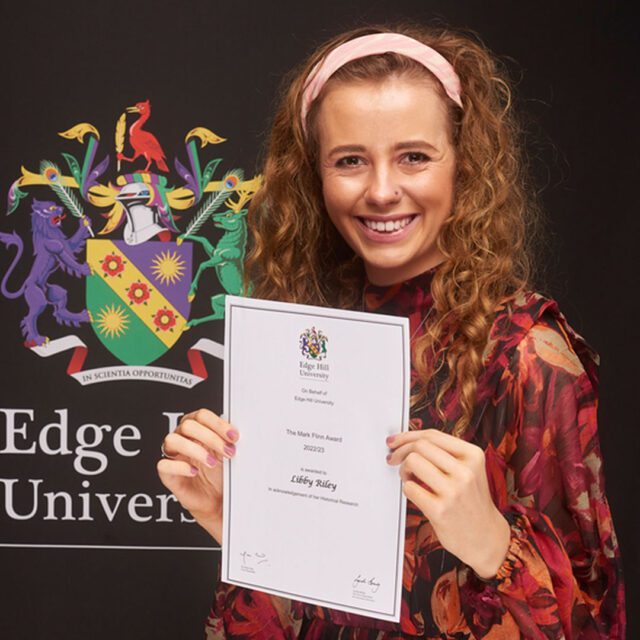Libby Riley
BA (Hons) History

Many of the topics in each module go beyond large-scale events to include social and cultural history, or what was happening amongst the ordinary people at the time.
At GCSE and A Level I realised how much I enjoyed history and how enthusiastic I was about studying it. I enjoyed the variety of topics that I learnt about, from the complex politics of the Tudor dynasty and the evolution of medicine and healthcare to the development of modern-day America and twentieth century music in the United Kingdom (a topic I chose for my coursework).
I enjoy learning about the politics, culture, and sociology of the past. Though many may dismiss history as “what has already happened,” I see it as a valuable way of seeing how much—or, in some cases, how little—society has changed over time. Studying it at a higher level gave me the opportunity to seek out more topics to learn about and analyse deeper.
I chose Edge Hill University for its facilities. Edge Hill has an excellent campus, with a large library, archive and study space to work in, a great sports centre with a gym, pool and many indoor and outdoor spaces, and many opportunities for leisure, including the Hub and the Student Union bar. All of this alongside good accommodation both on campus and in Ormskirk.
I enjoy the community and experience at Edge Hill, as there are a wide variety of societies and facilities available for any interest. I’ve met some excellent people through these and it’s helped me come out of my shell. Ormskirk is a great town with everything you need for shopping or eating out in one place, and for days out, Liverpool, Manchester and Preston are under an hour away on the train.
For History students, there is a wide variety of module options to take. From European migration and the rise and fall of Communism, to the development of British journalism and the sociology of crime in the nineteenth and twentieth century, no matter where your interests lie, you will find something you’ll enjoy studying.
My most memorable moment was visiting the Wigan and Leigh Archives (partnered with Haigh Hall) for my placement in the Making History module. At the archive history is presented to the public through blogs, museums and documentaries, for example. During this time on placement, I learnt how archived material is stored, conserved, and categorised, and how to search within an archive for the information I need.
I enjoy the variety of options given for us to study, many of which are events, periods and methods we have never studied much of before. For example, one of my modules for my second year detailed Islamism from the First World War to the modern day. This was an exciting opportunity for me to study the modern history of the Middle East, which I had never studied previously.
Many of the topics in each module go beyond large-scale events to include social and cultural history, or what was happening amongst the ordinary people at the time. For example, the module Digital Detectives details the types of crimes that were widespread in the eighteenth and nineteenth century and who was perpetrating them, as well as how they were dealt with (whether this was through transportation, the new prison system, or the controversial Bloody Code).
I am looking into postgraduate study when I graduate and then I am planning for a career in archives and research. The past year has influenced my ambitions for the future, as using archives, both physical and digital, has greatly helped me in finding sources both for my coursework and for any other research I undertake.
I would advise any history student to read up on their modules not only during their semester, but also before. The reading lists are usually placed online, and if not, they can usually be acquired by contacting the module leader.These usually include a mixture of books, book chapters, journal articles and various websites, and most can be found in the university library, meaning fewer costs out of the student loan.
Picking out relevant chapters for the topic you are studying is usually better than reading the entire book in one sitting. If it’s a physical book, place sticky tabs on the relevant pages, and when you’re done, take them out before returning the book or placing it for reshelving.If it’s an eBook, use the bookmark feature.
I also recommend printing out journal articles, web pages and eBook chapters, as you can highlight and annotate relevant facts or quotes. To save paper and money, print multiple pages on one, and use both sides. I recommend reading and studying in the Catalyst, preferably on the top floor away from any distractions if you feel you will work better that way.